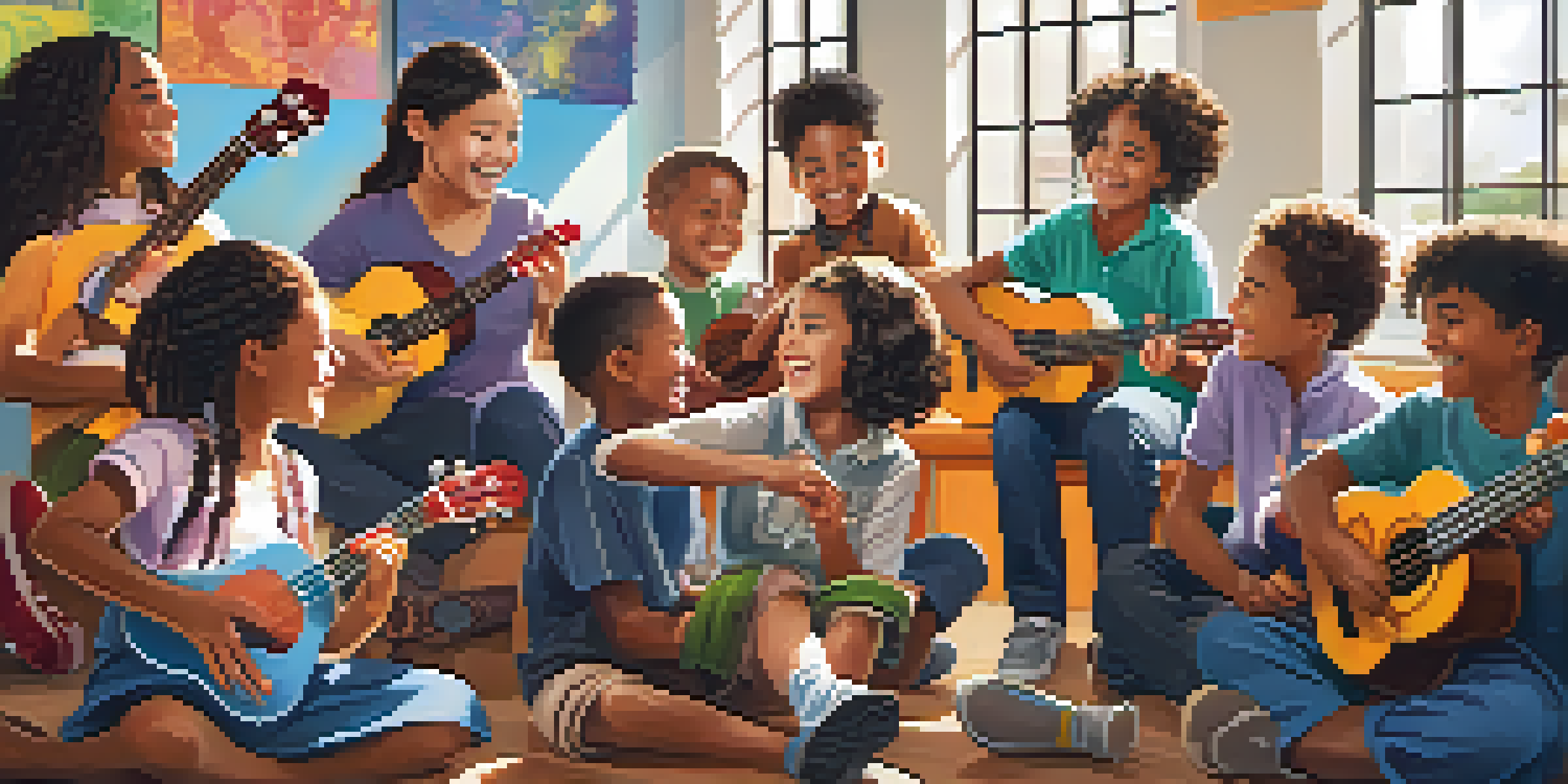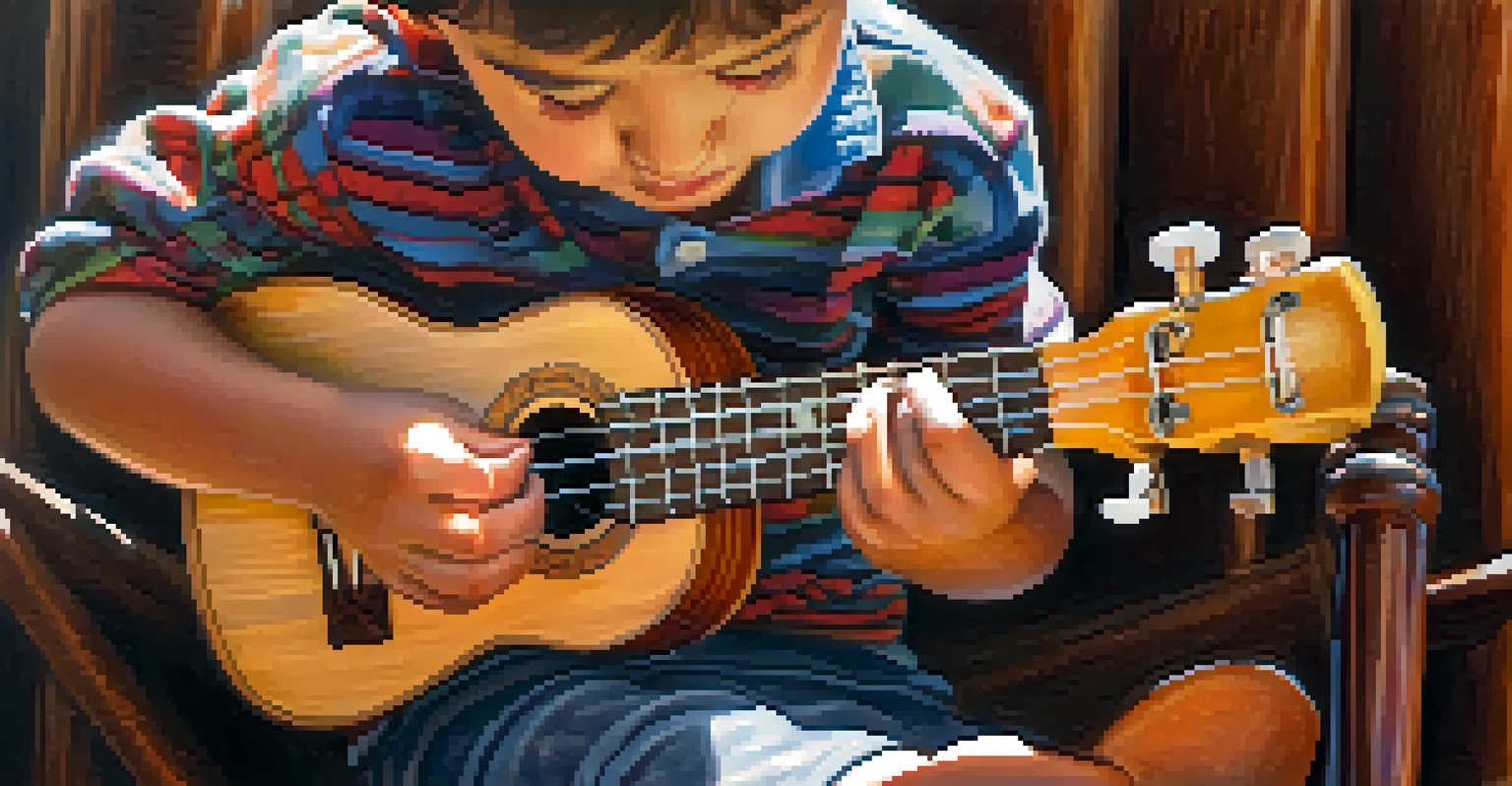Integrating Ukulele into Elementary Music Curriculum for Success

Why Ukulele? The Benefits for Young Learners
The ukulele is an ideal instrument for elementary students due to its size and ease of play. With only four nylon strings, children can quickly learn basic chords, fostering a sense of accomplishment early on. The light weight of the ukulele makes it easily portable, allowing students to practice anywhere, from classrooms to backyards.
Music can change the world because it can change people.
Moreover, the ukulele's cheerful sound can brighten any classroom atmosphere, making music lessons more enjoyable. This positive vibe can help foster a love for music that stays with students for a lifetime. Additionally, playing the ukulele can enhance fine motor skills and hand-eye coordination, which are crucial for young children's development.
Finally, the ukulele is versatile, suitable for various musical styles, from folk to pop. This flexibility allows teachers to tailor lessons to their students’ interests, keeping them engaged and motivated. In essence, integrating the ukulele into the curriculum can cultivate both musical abilities and personal growth.
Creating a Ukulele-Friendly Classroom Environment
To successfully integrate the ukulele into the music curriculum, creating a welcoming environment is key. Start by setting up a dedicated space for music activities that is comfortable and free from distractions. Incorporate colorful posters of famous ukulele players or musical notes to inspire creativity and excitement.

It's also helpful to have enough ukuleles available for each student, ensuring they all have the opportunity to participate. Consider organizing a 'ukulele corner' where students can explore the instrument during free time. This not only promotes engagement but also encourages peer learning as students share tips and tricks.
Ukulele Boosts Young Learners
The ukulele's simplicity and cheerful sound make it perfect for helping young students develop musical skills and personal growth.
Lastly, incorporate technology by using apps and online resources that support ukulele learning. Many platforms offer tutorials and play-along tracks, making practice more interactive and fun. Embracing these tools can enhance the overall learning experience for students.
Incorporating Ukulele into Music Lessons
Integrating the ukulele into existing music lessons can be a seamless process. Start by introducing simple songs that students can learn to play quickly, which fosters a sense of achievement. Songs with repetitive chord progressions are particularly effective, as they allow students to focus on rhythm and timing without getting bogged down by complexity.
The ukulele is a great instrument for fostering creativity and joy in music.
You can also introduce music theory concepts through ukulele playing. For instance, as students learn different chords, they can gain a better understanding of scales and key signatures. By associating theory with a hands-on instrument, students are more likely to grasp these concepts and retain them.
Group activities, such as ensemble playing, can also be incorporated. Encourage students to work together to create harmonies or to accompany one another, fostering teamwork and communication skills. This collaborative aspect not only enhances their musical abilities but also builds lasting friendships.
Engaging Students with Fun Ukulele Activities
To keep students excited about learning the ukulele, incorporate fun activities into lessons. For example, organize 'ukulele jam sessions' where students can play together, experiment with new songs, and share their unique styles. These sessions can be informal and encourage creativity without the pressure of perfection.
Consider hosting a 'ukulele showcase' where students can perform for their peers and family. This event not only boosts confidence but also allows students to take pride in their progress. Plus, it creates a sense of community as families come together to celebrate the students' achievements.
Create a Music-Friendly Space
Establishing a dedicated and inspiring environment for ukulele practice enhances student engagement and peer learning.
Another great idea is to tie in seasonal themes or cultural events with ukulele songs. For instance, teaching holiday songs or pieces from different cultures can make lessons relevant and engaging. This approach not only broadens students’ musical horizons but also deepens their appreciation of diverse traditions.
Encouraging Creativity Through Composition
Encouraging students to compose their own music can be a powerful way to deepen their connection to the ukulele. Start with simple guidelines, such as creating a melody using specific chords they've learned. This hands-on approach allows students to express themselves while applying their skills creatively.
Moreover, composition can be a collaborative effort. Group projects, where students work together to create a song, can foster teamwork and innovation. Encouraging them to brainstorm lyrics or themes helps to develop their storytelling abilities, making music composition a holistic learning experience.
Finally, showcase these compositions in the classroom or during school events. This recognition can motivate students to continue exploring their musical creativity. By integrating composition into the curriculum, you not only enhance their ukulele skills but also nurture their artistic voices.
Utilizing Technology to Enhance Learning
In today’s digital age, technology can play a vital role in enhancing ukulele education. Online tutorials, apps, and interactive websites offer students additional resources for learning at their own pace. These tools can complement traditional instruction and cater to different learning styles, making music education more inclusive.
Moreover, consider using video platforms to create virtual lessons or share performances. This not only provides students with a sense of accomplishment but also allows for feedback from peers and teachers. Incorporating technology in this way can make learning more dynamic and engaging.
Embrace Technology in Music Lessons
Utilizing online resources and apps can enrich the ukulele learning experience and cater to diverse learning styles.
Finally, encourage students to explore music production software. They can experiment with recording their ukulele performances or layering tracks to create unique sounds. This exposure to technology not only enriches their musical experience but also builds valuable skills for the future.
Assessing Progress and Celebrating Achievements
Regular assessment of students' progress is essential for maintaining motivation and guiding instruction. Use informal assessments, such as observation during practice sessions or feedback during group activities, to gauge their understanding and skills. This approach fosters a supportive environment where students feel comfortable learning at their own pace.
Consider implementing self-assessments where students reflect on their growth and set personal goals. This practice encourages ownership of their learning journey and can lead to increased motivation. It also helps them understand the importance of perseverance and dedication.

Finally, celebrating achievements, both big and small, can be incredibly motivating. Organize recognition events or share successes in class newsletters. By acknowledging their progress, you reinforce the value of hard work and encourage a lifelong passion for music.